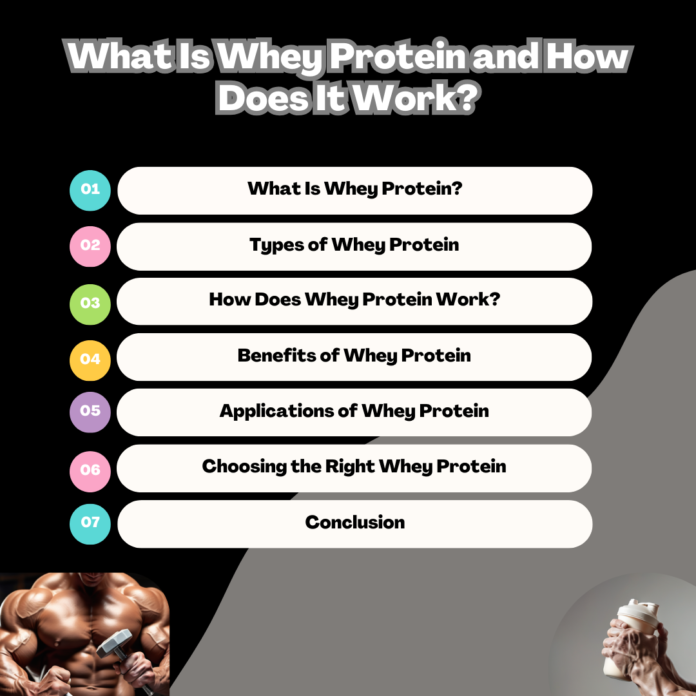Whey protein has become a staple in the fitness and health industry, revered for its impressive benefits and versatile applications. But what exactly is whey protein, and how does it work to support our health and fitness goals? In this comprehensive guide, we will delve into the intricacies of whey protein, exploring its origins, benefits, mechanisms, and applications.
What Is Whey Protein?
Whey protein is a high-quality protein derived from **milk** during cheese-making. When milk is coagulated, it separates into curds and whey. Whey is the liquid portion containing a significant amount of proteins, lactose, minerals, and vitamins. This liquid whey is then processed to remove most fats and carbohydrates, resulting in a concentrated form of protein powder.
Types of Whey Protein
Whey protein is available in three main forms: Whey Protein Concentrate (WPC), Whey Protein Isolate (WPI), and Whey Protein Hydrolysate (WPH).
1. Whey Protein Concentrate (WPC):- This form contains about 70-80% protein, along with some fats and carbohydrates. It is the least processed form and retains most of the beneficial nutrients found in whey.
2. Whey Protein Isolate (WPI):- WPI undergoes further processing to remove most of the fats and carbohydrates, resulting in a product that is about 90-95% protein. It is ideal for those looking for a higher protein content with minimal additional calories.
3. Whey Protein Hydrolysate (WPH):- WPH is pre-digested, making it the fastest-absorbing form of whey protein. It is often used in medical protein supplements and infant formulas due to its quick digestibility and reduced potential for allergic reactions.
The Mechanism of Whey Protein
How Does Whey Protein Work?
Whey protein works primarily through its high biological value (BV), which is a measure of how efficiently the body can utilize the protein. Whey protein has one of the highest BV scores, meaning it is easily absorbed and utilized by the body.
Amino Acid Profile:- Whey protein is rich in essential amino acids, particularly branched-chain amino acids (BCAAs) like leucine, isoleucine, and valine. Leucine is known for its role in stimulating muscle protein synthesis, which is crucial for muscle growth and recovery.
Rapid Absorption:- One of the standout features of whey protein is its rapid absorption rate. This is particularly beneficial post-workout, as the body can quickly utilize the protein to repair and build muscle tissues. The fast absorption also helps in minimizing muscle breakdown and promoting faster recovery.
Benefits of Whey Protein
-
Muscle Growth and Recovery:- Whey protein is a popular choice among athletes and bodybuilders due to its ability to enhance muscle growth and recovery. The high leucine content in whey protein stimulates muscle protein synthesis, leading to increased muscle mass over time. Additionally, the quick absorption of whey protein ensures that muscles receive the necessary nutrients promptly, reducing recovery time and soreness.
-
Weight Management:- Incorporating whey protein into your diet can aid in weight management. Protein is known to increase satiety, which can help reduce overall calorie intake. Moreover, whey protein supports the maintenance of lean muscle mass during weight loss, ensuring that most of the weight lost comes from fat rather than muscle tissue.
-
Immune System Support:- Whey protein contains various bioactive components, such as immunoglobulins and lactoferrin, which have been shown to support immune function. These components can help enhance the body’s defence mechanisms, making whey protein a valuable addition to the diet, especially during times of stress or illness.
-
Nutrient-Rich:- Whey protein is not only a source of high-quality protein but also provides essential nutrients such as calcium, magnesium, and vitamins B2 (riboflavin) and B12. These nutrients play vital roles in maintaining overall health and well-being.
Applications of Whey Protein
-
Post-Workout Nutrition:- One of the most common uses of whey protein is as a post-workout supplement. Consuming whey protein immediately after exercise can help kickstart the muscle recovery process, replenish depleted energy stores, and reduce muscle soreness.
-
Meal Replacement:- Whey protein shakes can serve as a convenient meal replacement option, especially for those with busy lifestyles. They provide a balanced source of protein, fats, and carbohydrates, ensuring that you receive essential nutrients even when on the go.
-
Baking and Cooking:- Whey protein powder can be incorporated into various recipes to boost their protein content. From protein pancakes to smoothies and even soups, the versatility of whey protein makes it easy to enhance the nutritional profile of everyday meals.
Choosing the Right Whey Protein
-
Quality and Purity:- When selecting a whey protein supplement, it is essential to consider the quality and purity of the product. Look for products that have undergone minimal processing and do not contain unnecessary additives or fillers.
-
Third-Party Testing:- Opt for whey protein supplements that have been third-party tested for quality and purity. This ensures that the product meets high standards and is free from contaminants.
-
Flavor and Mixability:- Choose a whey protein that suits your taste preferences and mixes well with your chosen liquids. Many brands offer a variety of flavours, so you can find one that you enjoy.
Conclusion
Whey protein is a powerful supplement for supporting muscle growth, recovery, and overall health. Its high biological value, rapid absorption, and rich nutrient profile make it an excellent choice for athletes, fitness enthusiasts, and anyone looking to improve their protein intake. By understanding what whey protein is and how it works, you can make informed decisions about incorporating it into your diet to achieve your health and fitness goals.



